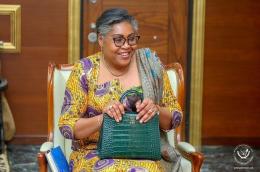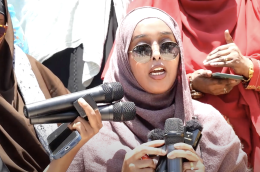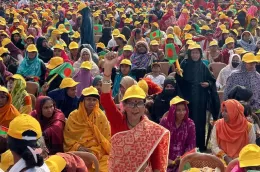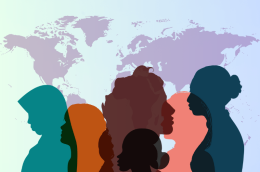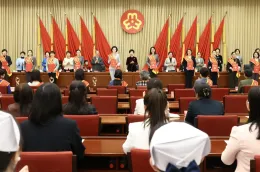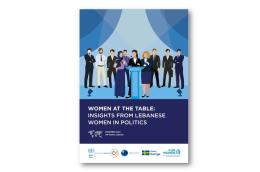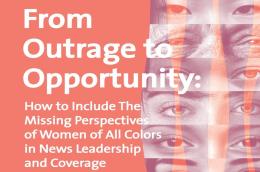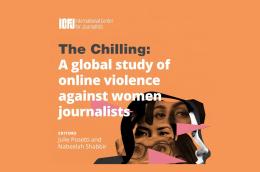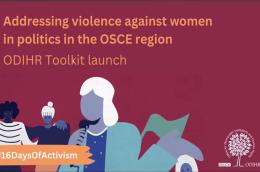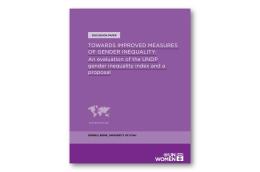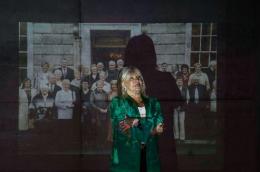Women's Leadership
Main navigation
President Felix Tshisekedi of the Democratic Republic of Congo has appointed Judith Suminwa Tuluka as the country’s next prime minister. Judith, a former planning minister, makes history as the first woman to hold the position. She takes over from Jean–Michel Sama Lukonde Kyenge, who served as prime minister from 2021 to 2024.
In her new role as prime minister, Judith will be tasked with advancing the president’s agenda, which focuses on employment, youth, women and national cohesion for the nation of about 100 million people. In her first televised address as prime minister, she acknowledged the challenges: “The task is big, the challenges are immense but together… we will get there. She emphasised the importance of her role, stating, “I am aware of the great responsibility that is mine.”
Read here the full article published by Bella Naija on 3 April 2024.
Image source: Bella Naija
MOGADISHU (HORN OBSERVER) – In a press conference joined by local women activists on Monday, Somali women Members of Parliament (MPs) expressed their frustration and lack of political will to include a 30% women quota in the constitutional amendments amidst a heated debate over the Somali Provisional Constitution.
"What we were pushing for was that the women quota of 30% be included into the constitution. But sadly, we have now seen that a new parallel process was started which excludes women quota,” said MP Ifrah Naaleeye, highlighting the challenges faced in advancing women’s representation.
The MPs condemned recent comments from political and religious groups opposing the women’s quota, citing religious grounds, a view dismissed by many religious scholars.
"Those who spoke in the Jazeera hotel and said that women quota is haram. I want to ask them where were they when women were killed, raped and abused?” questioned MP Ifrah Naaleeye, challenging the basis of the opposition.
Additionally, the MPs criticized remarks made by the Mayor of Mogadishu and the Somali prime minister, accusing them of using religion to confine women to their homes instead of addressing issues of violence and threats faced by women activists.
Joining the MPs in their advocacy were women activist groups, emphasizing the importance of respecting women’s political participation in Somalia.
Click here to read the full article published by the Horn Observer on 20 March 2024.
Image source: Horn Observer
The European Union and partners launch the Women’s Leadership Initiative, a component of the Women and Youth in Democracy Initiative (WYDE), in New York today during the 68th Session of the Commission on the Status of Women.
Commissioner for International Partnerships Jutta Urpilainen said: “In recent years, we have witnessed the erosion of democratic values. And when democracy is being eroded, women’s rights are under attack as well. Protecting democracy means ensuring an open civic and political landscape in which women can participate safely. This is the objective of the Women Leadership programme which I am pleased to launch today with our partners as part of the EU’s Women and Youth in Democracy Initiative.”
With €11.5 million from the EU for a period of three years, the WYDE | Women’s Leadership Initiative will promote the full and effective participation in decision-making of diverse women, especially those most often left furthest behind, by leveraging collective action, partnerships, coordination, knowledge, and resources at global level. The initiative will prioritise changing the social norms and cultural attitudes that portray the roles of women in communities and society as incompatible with political power. It will build the political skills of young women, and engage men, boys, office holders and the media as allies for gender equality and women’s empowerment.
Read here the full article published by the EU International Partnerships on 14 March 2024.
Image source: EU International Partnerships
The landscape of women leadership in Bangladesh presents a paradox: despite notable female figures in key political positions, the overarching advancement of women into leadership roles remains stagnant. Despite having a female prime minister, a female speaker, women ministers and lawmakers and women heading the major political parties, the desired progress towards gender parity in leadership is yet to be achieved.
The mandated quota of 33% female representation in all political party committees by 2020 has not been met. While there has been an increase in the participation of women in politics, their ascension to leadership roles lags significantly behind.
Apart from the Awami League and the BNP, the left-wing political parties have fallen short of meeting the prescribed targets, with little visible action towards fulfilling the goal of one-third female representation by 2030.
Zara Zebin Mahbub, a seasoned MP representing the Awami League's reserved women's seat from Chapainawabganj, highlights the systemic barriers hindering women's progress.
She said: "Women are as active as men in politics, but only men are promoted. Despite women's equal efforts, men dominate party nominations, media coverage, and resources. The main obstacles for women in elections are men's influence, muscle power, and financial advantage."
Read here the full article published by the Dhaka Tribune on 8 March 2024.
Image source: Dhaka Tribune
In commemoration of International Women's Day, Global Voices is delving into the state of women's political participation around the world. This year, over 3 billion people are eligible to vote, making it the largest electoral moment in history. Women’s participation in this election year, whether through advocating for policies that benefit women and girls, turning out to vote, or outright running for office, can create significant and meaningful change and is an essential part of fostering gender equality around the world.
In this special coverage, we highlight the distinct stories, triumphs, and challenges faced by women in the political arena. While the strides towards gender equality have been significant, systemic barriers persist — often in the form of gender-based harassment or violence — hindering the full realization of women's political potential.
Already in the first quarter of the year, women politicians and voters from Argentina to Indonesia have faced unique gendered attacks and harassment for daring to participate in the political ecosystem. In many contexts, these harassment campaigns are launched because women are challenging the status quo and trying to reshape the political landscape of their nations away from oppressive patriarchal norms.
Read here the full article published by Global Voices on 8 March 2024.
Image source: Global Voices
Today, China joins the world in celebrating International Women’s Day. Mao Zedong once famously said that women hold up half the sky. According to World Bank data, China’s female labour force participation rate of more than 61 per cent is higher than many developed economies.
Chinese women work alongside men and contribute in almost every domain and at almost every level. All of China reaps the benefits of this participation and representation.
Unfortunately, one glaring exception is arguably the most important – high-level politics. Women have represented only a small percentage of the full members of the Communist Party of China’s Central Committee, with no clear upward trend and only slight fluctuations in this figure.
The past two decades represented the pinnacle of female representation in the Politburo, with one woman present among 25 members and even two between 2012 and 2017. But this is no longer the case, as the current Politburo includes only 24 men.
Read here the full article published by the South China Morning Post on 8 March 2024.
Image source: South China Morning Post
